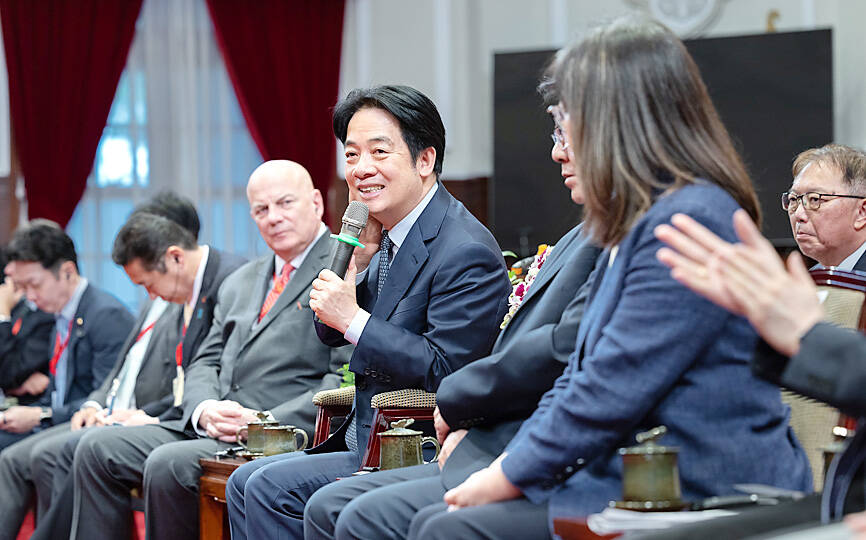Two senior Philippine officials and one former official yesterday attended the Taiwan International Ocean Forum in Taipei, the first high-level visit since the Philippines in April lifted a ban on such travel to Taiwan.
The Ocean Affairs Council hosted the two-day event at the National Taiwan University Hospital International Convention Center.
Philippine Navy spokesman Rear Admiral Roy Vincent Trinidad, Coast Guard spokesman Grand Commodore Jay Tarriela and former Philippine Presidential Communications Office assistant secretary Michel del Rosario participated in the forum.

Photo Courtesy of the Presidential Office
More than 100 officials, experts and entrepreneurs from 15 nations participated in the forum, which included discussions on countering China’s hybrid warfare and managing the sustainable use of ocean resources.
The Philippine delegation’s visit to Taiwan marked a symbolic turning point in the relationship between the two nations since Philippine President Ferdinand Marcos Jr rescinded the ban on official travel to Taiwan that had been in place since 1989.
The reversal of the policy came amid rising tensions between China and the Philippines in the South China Sea, which had led to altercations between the nations’ coast guards, including ship collisions.
The Philippines had conducted exchanges with Taiwan through low-profile meetings until Marcos removed the restrictions.
The visit was likely carried out despite opposition from China, as Indonesia pulled out from attending the forum a day before it started.
At an event at the Presidential Office on Tuesday ahead of the forum, President William Lai (賴清德) met all the participants and said that Taipei would continue working with democratic partners in keeping the seas free and open as part of Taiwan’s commitment to ocean governance and maritime security.
The nation is to continue promoting green shipping, sustainable fishing and maritime renewable energy, among other forms of industrial transformation, he said.
Taiwan’s maritime strategy must also emphasize security, as China’s continued “gray zone” aggression has created “serious threats and challenges to peace and stability” in the Taiwan Strait, he said.
At yesterday’s forum, Ocean Affairs Council Minister Kuan Bi-ling (管碧玲) said that global collaboration in ocean affairs has transcended traditional conservation concerns to become a core strategic issue underpinning regional security, economic resilience and the rules-based international order.
Thomas McDevitt, chairman of the Washington Times’ board of directors, said Taiwan has become a global beacon of democracy and a key partner for many nations.
China responded to Lai’s presidential inauguration speech last year — in which he declared Taiwan’s commitment to freedom and democracy — with threats and military activities that have not abated, McDevitt said, adding that the world is in a “civilizational crisis.”
National Security Council Deputy Secretary-General Lin Fei-fan (林飛帆) said China’s military activities — mirrored by Russia in the Baltic Sea — made countering maritime “gray zone” tactics a global challenge.
He urged nations at the forum to establish legal mechanisms, and join forces in detecting and dealing with incursions to respond to Beijing’s aggression.
The global community should enhance collaboration to address climate change, bolster societal resilience and defend democracy, Lin added.

CHAOS: Iranians took to the streets playing celebratory music after reports of Khamenei’s death on Saturday, while mourners also gathered in Tehran yesterday Iranian Supreme Leader Ayatollah Ali Khamenei was killed in a major attack on Iran launched by Israel and the US, throwing the future of the Islamic republic into doubt and raising the risk of regional instability. Iranian state television and the state-run IRNA news agency announced the 86-year-old’s death early yesterday. US President Donald Trump said it gave Iranians their “greatest chance” to “take back” their country. The announcements came after a joint US and Israeli aerial bombardment that targeted Iranian military and governmental sites. Trump said the “heavy and pinpoint bombing” would continue through the week or as long

TRUST: The KMT said it respected the US’ timing and considerations, and hoped it would continue to honor its commitments to helping Taiwan bolster its defenses and deterrence US President Donald Trump is delaying a multibillion-dollar arms sale to Taiwan to ensure his visit to Beijing is successful, a New York Times report said. The weapons sales package has stalled in the US Department of State, the report said, citing US officials it did not identify. The White House has told agencies not to push forward ahead of Trump’s meeting with Chinese President Xi Jinping (習近平), it said. The two last month held a phone call to discuss trade and geopolitical flashpoints ahead of the summit. Xi raised the Taiwan issue and urged the US to handle arms sales to

BIG SPENDERS: Foreign investors bought the most Taiwan equities since 2005, signaling confidence that an AI boom would continue to benefit chipmakers Taiwan Semiconductor Manufacturing Co’s (TSMC, 台積電) market capitalization swelled to US$2 trillion for the first time following a 4.25 percent rally in its American depositary receipts (ADR) overnight, putting the world’s biggest contract chipmaker sixth on the list of the world’s biggest companies by market capitalization, just behind Amazon.com Inc. The site CompaniesMarketcap.com ranked TSMC ahead of Saudi Aramco and Meta Platforms Inc. The Taiwanese company’s ADRs on Tuesday surged to US$385.75 on the New York Stock Exchange, as strong demand for artificial intelligence (AI) applications led to chip supply constraints and boost revenue growth to record-breaking levels. Each TSMC ADR represents

State-run CPC Corp, Taiwan (CPC, 台灣中油) yesterday said that it had confirmed on Saturday night with its liquefied natural gas (LNG) and crude oil suppliers that shipments are proceeding as scheduled and that domestic supplies remain unaffected. The CPC yesterday announced the gasoline and diesel prices will rise by NT$0.2 and NT$0.4 per liter, respectively, starting Monday, citing Middle East tensions and blizzards in the eastern United States. CPC also iterated it has been reducing the proportion of crude oil imports from the Middle East and diversifying its supply sources in the past few years in response to geopolitical risks, expanding